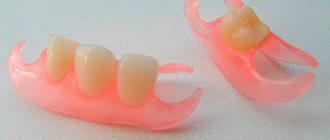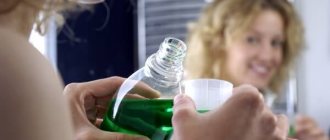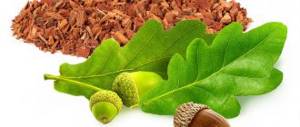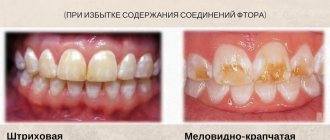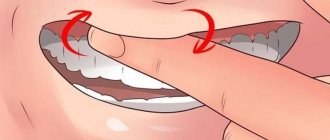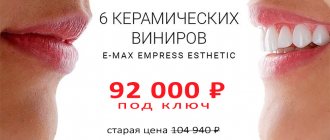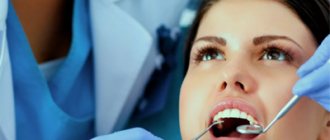Author of the article:
Soldatova Lyudmila Nikolaevna
Candidate of Medical Sciences, Professor of the Department of Clinical Dentistry of the St. Petersburg Medical and Social Institute, Chief Physician of the Alfa-Dent Dental Clinic, St. Petersburg
Propolis is a sticky, resinous substance that bees use to seal holes in the hive and disinfect the cells. Propolis consists of resins from the spring buds of birch, alder or poplar, modified with enzymes.
The miraculous properties of this natural building material have been noticed by people for a long time. Our ancestors used propolis to treat gums. And today, bee products are considered one of the most effective means for combating various dental diseases. Such substances are used both in pure form and in tinctures, ointments and sprays.
You can purchase medicines containing propolis in almost every pharmacy. There is a wide selection of ready-made tinctures for rinsing, ointments and toothpastes based on it.
We will tell you how to properly treat gums with propolis, as well as its beneficial properties and limitations in use.
What effect does propolis have?
Propolis is also called bee glue. It consists of resin, wax, essential oils, enzymes, pollen and bee venom. This natural product is rich in amino acids, minerals and vitamins (A, E, C), zinc and magnesium, therefore it is actively used in folk medicine, both in its pure form and processed into various medicines.
Propolis is not a panacea for dental diseases. It cannot be used as the only remedy for a long time, because it will stop the signs of the inflammatory process (if any) and create the illusion that everything is in order. If your tooth hurts or your gums are inflamed, you should go to the dentist, who will determine the true cause of the problem and prescribe specialized treatment.
Propolis can reduce the intensity of pain, so it is used if your teeth and gums hurt. It disinfects tissues, has an astringent effect on them, improves blood circulation, relieves signs of the inflammatory process (bleeding, swelling, redness, itching), and promotes the resorption of purulent inflammation. It has an antifungal effect, heals microcracks, burns, and accelerates the process of tissue regeneration. This is a natural antibiotic that does not disturb the state of natural microflora and stimulates the development of local immunity.
The substance can reduce the intensity of pain
Propolis is good because pathogenic microorganisms do not develop resistance to it, which means it can be used for a long time, it does not cause addiction and dysbacteriosis.
Information about calamus
Common calamus (from Latin Ácorus cálamus) is also called marsh or reed calamus. Belongs to the perennial calamus family. The plant can be found near coastal waters and swamps. Grows on a massive scale in Southeast Asia, North America, Russia, and Europe. In our country, calamus can most often be found in Southern Siberia, the Far East and the European part.
According to scientists, the homeland of calamus is China and India. But since ancient times, thanks to man, the plant was known throughout Asia. The spread of this species was determined by the fact that it grows on the banks of reservoirs, the water of which is suitable for drinking. Therefore, nomadic tribes, traveling, scattered rhizomes by overcoming water and swampy barriers.
The plant came to Russia in the 12th-13th centuries. It was brought by Tatar tribes. They were sure that calamus roots purify water in reservoirs, which becomes suitable for consumption. In order to drink water from an unknown river, the Tatars always carried a calamus root with them and added it to their drink. Calamus has a subtle spicy aroma. It was used as a replacement for bay leaf, cinnamon, and ginger root. The root is used in medicine.
For what dental pathologies can it be used?
- toothache,
- stomatitis,
- damage to the mucous membrane,
- halitosis (bad breath),
- fistula, flux, abscess, cyst, granuloma,
- hyperesthesia, that is, increased sensitivity of the enamel,
- inflammation of periodontal tissues: gingivitis, periodontitis, periodontal disease.
The drug can be used in the treatment of fistula
Chemical characteristics
The rich composition of this perennial plant allows you to cure diseases of teeth and gums. The ancient Greeks and Romans already knew that calamus helps with toothache and bleeding gums. The rhizome contains:
- complex essential aromatic oils;
- tannins;
- phytoncides;
- starch;
- organic acids;
- tannins;
- resins;
- ascorbic acid;
- palmitic acid;
- iodine;
- aromatic azarinaldehyde;
- macro and micro elements;
- vitamins.
Calamus oil appears as a yellow or light brown liquid. The oil tastes spicy-bitter and smells like a lava leaf. Rhizomes have wound-healing, soothing, and disinfectant effects. In addition, the root can produce an analgesic effect.
The most popular folk recipes based on propolis
Chewing gum for the prevention of dental diseases
If you want to maintain a high level of oral health, then chew the product in its pure form, because then it is considered as beneficial as possible. Just separate a small piece weighing 3-4 grams from the total mass, roll it into a ball (you need to do this with clean hands). Chew propolis once a day after meals for 10–15 minutes. It is recommended to spit out the remains, as the product contains wax, which is undesirable to swallow.
You need to chew propolis once a day
Chewing natural “gum” is also recommended for those who have a toothache. Within ten minutes you will notice that the discomfort goes away.
“My grandmother chewed propolis instead of gum all her life. I don’t know if it’s a coincidence or not, but she never had problems with her teeth and gums at all; she kept her teeth until old age. I tried to chew it, but it doesn’t last me long, the taste is specific, bitter, sometimes I even have a gag reflex, I can’t get used to it...”
[email protected] , review from woman.ru
Alcohol tincture
It can only be used if there are no open wounds, ulcers or inflammations in the oral cavity. You can buy a ready-made tincture at a pharmacy, or you can make it yourself at home.
To prepare the product at home, you will need medical alcohol (70%) or vodka. For every 100 grams of liquid you will need at least 10 grams of pureed or well-crushed propolis. It is necessary to place the ingredients in a glass container (it is better if it is dark) and leave for 3-4 days. The composition must be shaken every day. After the specified time, you need to strain the mixture through cheesecloth.
The tincture should not be used in concentrated form, otherwise it can cause irritation, itching, drying out and even burns of the mucous membrane. In case of pulpitis, the concentrate can enter the nerve of the tooth and cause a sharp pain reaction.
How to rinse your mouth with propolis tincture? You will need 2 teaspoons of tincture per glass of warm water. It is necessary to mix the ingredients thoroughly. You can rinse your mouth with the resulting mixture for 2-3 minutes, 2-3 times a day. After rinsing, you need to refrain from eating and drinking for half an hour so that the composition has the maximum possible effect.
This tincture can only be used if there is no damage to the oral cavity.
People who practice this method claim that rinsing the mouth with propolis reduces gum inflammation and temporarily relieves toothache. If you add sage or mint oil to the resulting solution, you can get rid of bad breath.
Water tincture
Due to the small number of contraindications, this recipe is very popular. There are no restrictions to it, except for allergies to bee products.
For every 10 grams of propolis (pre-grinded on a fine grater) you will need 100 milliliters of boiling water. Propolis should be mixed well in water until dissolved - the liquid should acquire a uniform brownish or orange color. Next, the mixture is infused for 24 hours, then filtered and used for its intended purpose, without being diluted. The resulting solution can be stored in the refrigerator for no more than 7 days in a row.
The drug is very popular
Suitable for relieving signs of inflammation in diseases of the gums and oral mucosa, for example stomatitis and gingivitis. If you apply the tincture to a cotton swab and apply it to a sore tooth, this will help reduce the intensity of pain - the analgesic effect is achieved within 10-15 minutes. The water tincture is also suitable for applications and oral baths, which promote rapid healing of the mucous membrane after surgery.
Paste enriched with propolis
Just add 1-2 drops of any tincture (alcohol or water) to the paste when brushing your teeth, this will only enhance the positive properties of the paste. This little trick will help to thoroughly clean your teeth from plaque, increase blood circulation in the gums, and disinfect the oral cavity from bacteria. If you practice this method for several weeks, you may even notice a slight whitening effect on the enamel.
Contraindications for use
The traditional medicine product should be used with caution, because it can cause an acute allergic reaction, skin rash, itching and Quincke's edema. A high risk of developing allergies is present in those who suffer from eczema, diathesis, bronchial asthma, and diabetes. Treatment with propolis is contraindicated for young children. Bee products should not be used by those who have problems with the kidneys, liver or pancreas.
An allergic reaction can cause angioedema
If you use an alcohol tincture, then strictly follow the instructions for use. You should not rinse your mouth with a concentrated composition, otherwise you will only worsen your condition. Due to the “alcoholic” component, the tincture should not be used by children, nursing women or pregnant women, as if swallowed it can cause poisoning and intoxication of the body.
What not to do when using propolis
Do not use concentrated alcohol tincture for rinsing and lotions. You should also not leave propolis residue in your mouth overnight, hoping that the positive effect will be prolonged. Do not forget that, among other things, it contains sugar, and this is an excellent source of food for pathogenic bacteria that provoke the development of caries. If you used a beekeeping product in its natural form, then before going to bed, be sure to thoroughly brush your teeth with a brush, paste, rinse, floss and irrigator.
Network of social pharmacies "Stolichki" with low prices
The pharmacy network for social categories in the capital is developing at a tremendous pace, new points are opening in housing estates under construction in Moscow and other cities of the country. The institutions are conveniently located in the city infrastructure and operate at optimal times for the population, including around the clock. New points of sale and pharmacies located in different districts of the capital are constantly being added to the map. More convenience and comfort for patients is provided by the Stolichki online pharmacy with the ability to reserve medicine and then drive up and buy it. Low prices allow you to buy medications prescribed by your doctor inexpensively. In accordance with legal requirements, online payments in the pharmacy chain are not allowed, so payments can be made simply in the prescription department.
The benefits of propolis in toothpastes
Today on the shelves of stores and pharmacies you can find many toothpastes that contain propolis. These products are used to prevent inflammation of the mucous membrane, strengthen and reduce sensitivity of the gums, and in the complex treatment of gingivitis and periodontitis. They have a good antimicrobial and pronounced anti-inflammatory effect, help restore the balance of microflora and strengthen local immunity. Examples of such toothpastes: “Asepta”, “Forest Balm1” for healthy gums with propolis, Biomed PROPOLINE, PresiDENT Exclusive.
Such pastes have a good antimicrobial and pronounced anti-inflammatory effect.
Notice
: Undefined variable: post_id in
/home/c/ch75405/public_html/wp-content/themes/UltraSmile/single-item.php
on line
45 Notice
: Undefined variable: full in
/home/c/ch75405/public_html/wp-content /themes/UltraSmile/single-item.php
on line
46
Rate this article:
( 3 ratings, average: 3.67 out of 5)
gum disease
- Mikhalchenko V.F., Patrusheva M.S., Yakovlev A.T. The influence of medicinal complexes “Asepta” and “Forest Balsam” on clinical parameters and activity of gingival fluid enzymes in patients with mild periodontitis / Bulletin of new medical technologies. – 2012.
Consulting specialist
Dzagurova Elina Ruslanovna
Doctor rating: 9.5 out of 10 (2) Specialization: Dentist-therapist Experience: 10 years
Comments
I have been using an alcohol tincture with propolis for the second month now as a mouth rinse for gum inflammation. At first it got better, but now it seems to have the opposite effect, everything itches, what should I replace it with?
SS (04/27/2020 at 11:41 am) Reply to comment
- Tinctures with propolis in alcohol or vodka cannot be used for longer than 7–14 days, since the alcohol component dries out the mucous membrane and helps destroy not only harmful, but also beneficial bacteria. Perhaps your oral microflora balance has been disturbed and dysbacteriosis has arisen, but not because of propolis (it does not disturb the microflora), but precisely because of the alcohol component. Contact a dentist who will examine your oral cavity and select a course of treatment procedures and products according to your clinical situation.
Editorial staff of the portal UltraSmile.ru (05/03/2020 at 09:08) Reply to comment
Write your comment Cancel reply
Clinical researches
Repeated clinical studies have proven that using ASEPTA propolis gum gel for a week can reduce gum inflammation by 31%.
Sources:
- Comparative clinical evaluation of the effectiveness of treatment of traumatic lesions of the oral mucosa IORDANISHVILI A.K. *,** Doctor of Medical Sciences, Professor, Professor of the Department *Department of Orthopedic Dentistry of the Federal State Budgetary Educational Institution of Higher Education “North-Western State Medical University named after. I.I. Mechnikov" of the Ministry of Health of the Russian Federation (rector - Doctor of Medical Sciences Sayganov S.A.); **Department of Maxillofacial Surgery and Surgical Dentistry of the Federal State Budgetary Military Educational Institution of Higher Education “Military Medical Academy named after S.M. Kirov" of the Ministry of Defense of the Russian Federation (chief - Corresponding Member of the Russian Academy of Sciences, Professor A.Ya. Fisun).
- Study of the clinical effectiveness of treatment and prophylactic agents of the Asepta line in the treatment of inflammatory periodontal diseases (A.I. Grudyanov, I.Yu. Aleksandrovskaya, V.Yu. Korzunina) A.I. GRUDYANOV, Doctor of Medical Sciences, Prof., Head of Department I.Yu. ALEXANDROVSKAYA, Ph.D. V.Yu. KORZUNINA, asp. Department of Periodontology, Central Research Institute of Dentistry and Maxillofacial Surgery, Rosmedtekhnologii, Moscow
- The effectiveness of the use of Asept “adhesive balm” and Asept “gel with propolis” in the treatment of chronic generalized periodontitis and gingivitis in the acute stage (Municipal Dental Clinic No. 4, Bryansk, Kaminskaya T. M. Head of the therapeutic department Kaminskaya Tatyana Mikhailovna MUZ City Dental Clinic No. 4, Bryansk
